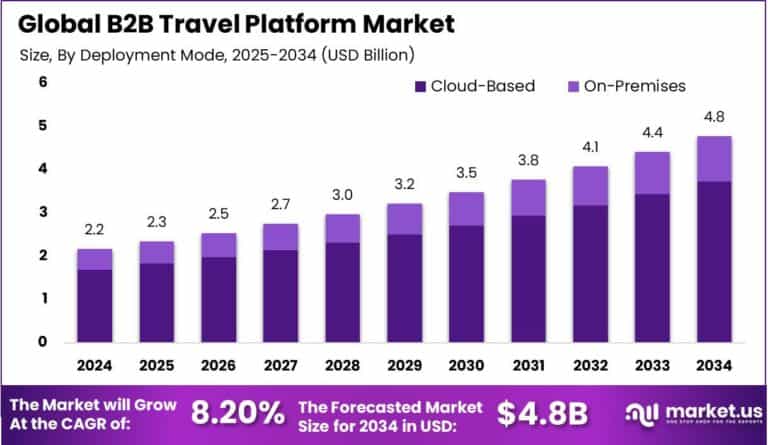Table of Contents
Introduction
The global B2B travel platform market is anticipated to grow from USD 2.17 billion in 2024 to USD 4.8 billion by 2034, registering a CAGR of 8.2%. In 2024, Asia-Pacific dominated with a 36% market share, generating USD 0.78 billion in revenue. China led the region with USD 0.25 billion, growing at a CAGR of 6.3%, driven by increasing digitalization and evolving corporate travel demands. The market growth is fueled by advancements in technology, demand for streamlined travel management, and rising business travel activities globally.

How Tariffs Are Impacting the Economy
Tariffs on technology hardware and software used in B2B travel platforms increase operational costs for service providers and end-users. Higher tariffs elevate prices of imported devices and components, translating into increased expenses for companies offering travel solutions. These inflationary pressures reduce corporate travel budgets and slow economic growth.
➤ Discover how our research uncovers business opportunities @ https://market.us/report/b2b-travel-platform-market/free-sample/
(Use corporate mail ID for quicker response)
Supply chain disruptions due to tariffs force firms to seek alternative suppliers or to localize production, often incurring higher costs and longer lead times. Retaliatory trade measures exacerbate market uncertainty, deterring investments in platform innovation and expansion. Collectively, tariffs hinder digital transformation, affecting the efficiency and scalability of B2B travel services.

Impact on Global Businesses
Global businesses in the B2B travel ecosystem face increased costs due to tariffs on essential technology infrastructure and software licenses. Supply chain shifts and supplier diversification add complexity and capital investment needs. Travel agencies and corporate clients experience delayed adoption of advanced platforms, affecting travel management efficiency and cost control. Emerging markets reliant on imports face affordability challenges, slowing digital travel platform penetration. Firms must optimize supply chains, invest in scalable cloud solutions, and innovate user experiences to remain competitive amid tariff-related pressures.
Strategies for Businesses
Companies mitigate tariff impacts by diversifying suppliers and investing in local technology development. Transitioning to cloud-based platforms reduces dependency on physical hardware. Predictive analytics support tariff risk anticipation and inventory management. Strategic partnerships with regional providers enhance supply chain resilience. Emphasizing automation and digital process optimization lowers operational costs. Advocacy for favorable trade policies complements business strategies. Overall, innovation, supply chain agility, and collaborative ecosystems are key to sustaining growth.
➤ Get full PDF access here @ https://market.us/purchase-report/?report_id=148874
Key Takeaways
- B2B travel platform market expected to grow at 8.2% CAGR through 2034
- Tariffs increase technology costs and disrupt supply chains
- Delayed adoption impacts corporate travel management efficiency
- Supply diversification and cloud adoption mitigate tariff effects
- Predictive analytics aids proactive tariff risk management
Analyst Viewpoint
The B2B travel platform market is steadily expanding, driven by growing corporate travel and digitalization. While tariffs pose cost and supply chain challenges, they also catalyze cloud adoption and supplier diversification. Market players focus on enhancing platform scalability and user experience. The future outlook remains positive as technological innovation and rising business travel demand support sustainable growth, overcoming trade uncertainties.
Regional Analysis
Asia-Pacific leads the B2B travel platform market with a 36% share in 2024, propelled by rapid digital transformation and expanding corporate travel in China, India, and Southeast Asia. China’s growing middle class and business sectors drive demand. North America and Europe show stable growth due to mature markets and advanced infrastructure. Regional differences stem from varying digital adoption rates, regulatory frameworks, and corporate travel trends.
➤ Discover More Trending Research
Business Opportunities
Rising demand for integrated, AI-driven travel management solutions presents growth opportunities. Emerging markets offer expansion potential as digital infrastructure improves. Customizable platforms catering to industry-specific travel needs attract clients. Partnerships with fintech and logistics firms enhance value-added services. Additionally, sustainable travel solutions and mobile-first platforms cater to evolving corporate priorities. Continuous innovation in data analytics and user experience will open new revenue streams.
Key Segmentation
Component
- Software
- Services
Deployment Mode
- Cloud-based
- On-premises
Application
- Travel Booking and Management
- Expense Management
- Reporting and Analytics
End User
- SMEs (Small and Medium Enterprises)
- Large Enterprises
- Travel Agencies
Key Player Analysis
Leading companies prioritize cloud scalability, AI integration, and seamless platform interoperability. Investment in R&D focuses on enhancing user experience and data analytics capabilities. Strategic partnerships with corporate clients and travel suppliers expand market reach. Market leaders emphasize compliance with global travel regulations and cybersecurity. Regional expansions through localized services strengthen competitive advantage. Continuous innovation and customer-centric solutions underpin market leadership.
Recent Developments
In 2025, major providers launched AI-powered expense management modules and mobile-first travel booking platforms. Strategic alliances with regional travel agencies expanded service footprints. Enhanced cybersecurity features responded to increasing data privacy demands.
Conclusion
The B2B travel platform market is set for steady growth driven by digital transformation and rising corporate travel. Tariff challenges encourage cloud adoption and supply chain diversification. Ongoing innovation and regional expansion will sustain market momentum.
Discuss your needs with our analyst
Please share your requirements with more details so our analyst can check if they can solve your problem(s)



